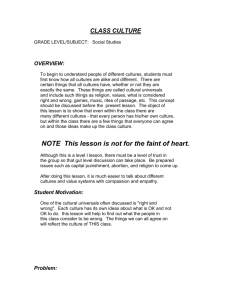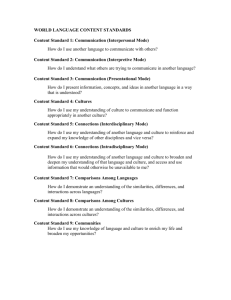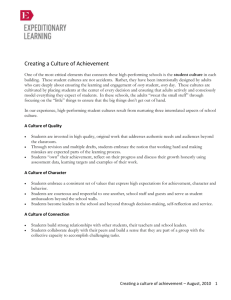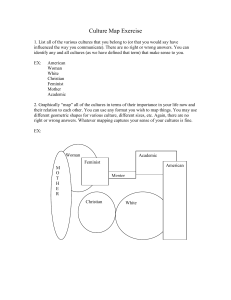Workplace activity: Cultural expectations:
advertisement
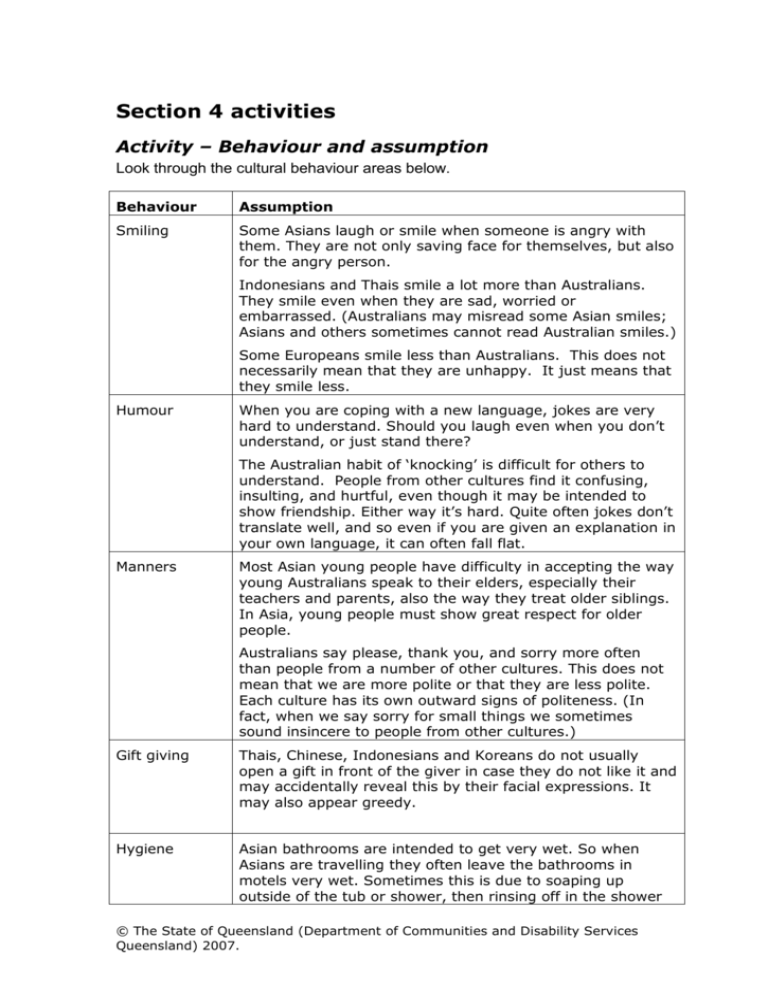
Section 4 activities Activity – Behaviour and assumption Look through the cultural behaviour areas below. Behaviour Assumption Smiling Some Asians laugh or smile when someone is angry with them. They are not only saving face for themselves, but also for the angry person. Indonesians and Thais smile a lot more than Australians. They smile even when they are sad, worried or embarrassed. (Australians may misread some Asian smiles; Asians and others sometimes cannot read Australian smiles.) Some Europeans smile less than Australians. This does not necessarily mean that they are unhappy. It just means that they smile less. Humour When you are coping with a new language, jokes are very hard to understand. Should you laugh even when you don’t understand, or just stand there? The Australian habit of ‘knocking’ is difficult for others to understand. People from other cultures find it confusing, insulting, and hurtful, even though it may be intended to show friendship. Either way it’s hard. Quite often jokes don’t translate well, and so even if you are given an explanation in your own language, it can often fall flat. Manners Most Asian young people have difficulty in accepting the way young Australians speak to their elders, especially their teachers and parents, also the way they treat older siblings. In Asia, young people must show great respect for older people. Australians say please, thank you, and sorry more often than people from a number of other cultures. This does not mean that we are more polite or that they are less polite. Each culture has its own outward signs of politeness. (In fact, when we say sorry for small things we sometimes sound insincere to people from other cultures.) Gift giving Thais, Chinese, Indonesians and Koreans do not usually open a gift in front of the giver in case they do not like it and may accidentally reveal this by their facial expressions. It may also appear greedy. Hygiene Asian bathrooms are intended to get very wet. So when Asians are travelling they often leave the bathrooms in motels very wet. Sometimes this is due to soaping up outside of the tub or shower, then rinsing off in the shower © The State of Queensland (Department of Communities and Disability Services Queensland) 2007. or tub. Also, some cultures do not use toilet paper. They may be used to bidets and will prefer to use a dipper of water. This can make bathrooms very wet. Often toilet seats are broken because many cultures do not have toilets with seats, but actually squat over the bowl. Many Asians do not blow their noses in front of others. For them, nose-blowing is really disgusting, but sniffing is socially acceptable. In some cultures, spitting in the street is a normal, acceptable practice. Greeting Bowing is the accepted greeting for Japanese people, while some of the indigenous cultures of the Arctic Circle and Polynesian cultures rub noses. Even amongst our young people greetings like High Five are common. Auslan and Australian Sign Language also have their own forms of greeting. You’ll often hear outback Aussies say ’G’day, ‘ow ya goin’, mate? Ya good, ‘ey‘?’ In the cities the young people have adapted some Americanisms, such as ‘That is so cool!’ Saving face and gesturing Avoidance of eye contact is a sign of great respect in some cultures, including Australian Indigenous culture. Many Australians regard having good eye contact as being very important in building trust. Body language differs from place to place. Sri Lankans and Indians often shake their heads from side to side when they mean ‘I understand’. Very confusing for us! Gestures vary in meaning from place to place. The beckoning ‘come here’ movement that we make with our index finger is extremely offensive and has totally different meaning in Indonesia. In some Asian cultures it is offensive to point, or to extend the hand palm up. In many cultures, particularly Asian, conflict, disagreements and problems are usually not handled openly. It is important not to lose face and the difficulty is usually not confronted openly. Often it does work out in the end anyway or it may be resolved with the help of a third person later. Australians often avoid confrontation too but this is seen as an inappropriate way; for many Asians this is the appropriate way. Friendship Hand holding between same-sex people is common in Thailand and Indonesia, and indicates friendship. It may be considered to be immoral to hold hands in public with a member of the opposite sex. © The State of Queensland (Department of Communities and Disability Services Queensland) 2007. Punctuality Pacific Islanders, some Australian Indigenous people, Thais, Malays and Indonesians seem to us to place little importance on time. They are accustomed to operating on ‘rubber time’, and punctuality is not important. Food Muslims do not pass things to each other with the left hand. Muslims do not eat anything containing pork, bacon or ham. Some will not eat from a plate that has at any time held pork. Some Muslims are anxious that they should only eat meat that has been slaughtered by a Muslim in the correct manner. Reactions to other situations Many Muslims do not touch dogs and must avoid being licked by one. Some may touch dogs, but may not touch a wet dog. Many Asians find it difficult to say ’No’, so they say ‘ Yes’ in a way that to them really means ’No’. Sometimes, if you ask them if they understand, they will say ‘Yes’ to save face for you and them. Really, they may not understand. You need to clarify by asking in another way. Many cultures, especially those associated with Islam and many Asian cultures, do not like to do business with women. Women in their cultures usually do not hold positions of authority. They may also not acknowledge a woman when opening doors, etc. Many countries in Europe are still very male-dominated. Task Do some research to find one or two examples of cultural bias/assumptions in each area in a diverse range of cultures. Use the worksheet to record your findings. Consider subcultural groups such as: farmers and rural dwellers city folk young people people with a disability baby boomers and generation X and Y. © The State of Queensland (Department of Communities and Disability Services Queensland) 2007. Assumptions Worksheet Behaviour Assumption Smiling Humour Manners Gift giving Hygiene Greeting Saving face and gesturing Friendship Punctuality Food Reactions to other situations © The State of Queensland (Department of Communities and Disability Services Queensland) 2007.
